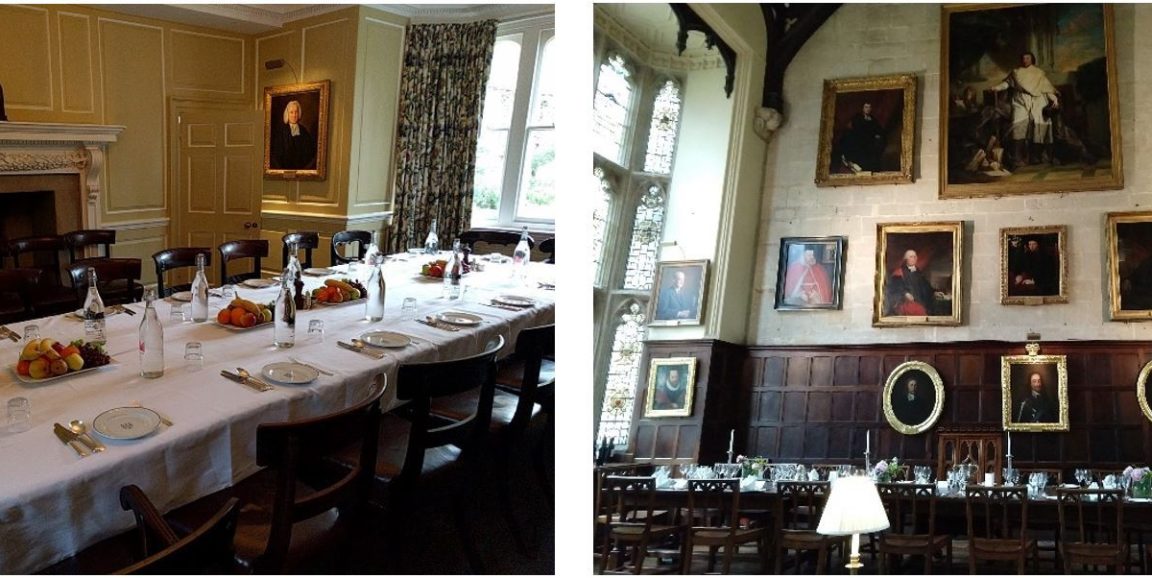After twenty years at Stanford, it was time for a sabbatical. I had earned a PhD in mechanical engineering and simultaneously joined the vascular surgery faculty and entered the medical device industry to work on catheter-based cardiovascular devices. After running the startup for five years, I suddenly got a book deal to write about my research, so I headed to Oxford as a Visiting Fellow of Exeter College to spend six months writing.
Many visions of my time at Oxford will play through my head for the rest of my life, including exploring many of the 38 colleges with my wife and three kids and enjoying picturesque Loch Ness in the bitter cold of early spring, and watching the last day of Summer Eights where we got to see the Exeter College Men’s second boat bump Worcester. But the two settings that have engrained in my mind most deeply are both at Exeter College: the lunch table in the Old Bursary and High Table in the hall.
The Old Bursary is where the members of Exeter College’s Senior Common Room (the faculty) gather for lunch every day. This practice is the most beautiful secret of Oxford. If you provide a free, three- or four-course lunch every day in a beautiful room in the heart of Oxford, people tend to show up. At Stanford, I’m lucky if I find two people to have lunch with, much less twenty-five.
During my first week, I sat next to an Engineering Fellow twice, and he politely told me I should find a different person to sit next to every day. After that, I was sandwiched between a particle physicist and an ancient philosopher, an earth scientist and a linguist, a classicist and a biochemist, and so on. The result was a wonderful milieu for exciting conversation filled with diverse cascading ideas and topics. I’ve been delighted with dozens of conversations about topics I didn’t even know existed. You know the saying, “You don’t know what you don’t know”? Yeah, it’s like that all the time.
One of the loveliest traditions is that Emeritus Fellows have lunch rights for life, and thus the rest of us are graced with the presence of grizzled wisdom for an hour each day. There’s nothing like the perspective of 70-90+ years of experience to put the latest controversy into context. Whether the discussion was about the changes to the pension scheme for academics, press about the dearth of minority students getting admitted to Oxford, or the latest misstep by the president across the pond, the Emeritus Fellows had the most subtle and elegant way of saying, “Chill out and don’t get your pants in a bunch.”
High Table in the main hall typifies the Oxford experience. Think the dining hall and the humongous raised table where all the professors sit in the Harry Potter movies. Never will you see grandness and fineness in such harmony, where the evening drips with formality and tradition, yet everyone is exceptionally warm and welcoming. Over Hilary (winter) and Trinity (spring) terms, I attended more than 30 High Tables and filled more than 35 guest spots, including 22 visitors from the U.S. Of course Exeter High Table was my favorite, where I got to host my guests and have “date nights” with my wife.
The first time dining there was like losing my virginity, with the architecture, paintings, place settings, and festive atmosphere intoxicating me as much as wine pairings generously poured with each course. The service was impeccable, and I never got tired of using silverware older than the United States. The head chef was amazing, mixing cuisines and even making haggis look and taste beautiful. Perfectly poached quail eggs that are just barely runny inside? That must require timing to the single digit seconds. After the meal, the Rector would personally pour coffee and tea for everyone, and there were plates of dates and chocolates laid out. Of course, there was the requisite table of Port, Sauternes, Armagnac, and Scotch in case you needed a nightcap (or four).
You never know who you’re going to meet at High Table: interesting alumni, director at the Wellcome Trust, senior editor of the Economist, a former Australian Prime Minister, an art dealer related to Alice Liddell, inspiration for Alice’s Adventures in Wonderland. I even managed to convince a critical care specialist visiting from New Zealand to write a chapter for my book within a two-hour meal. Most of these connections were fleeting, but there are a few that will certainly continue to enrich my life professionally and personally.
The past six months have been some of the most meaningful of all my life, with the opportunity to write a book, lecture on research and entrepreneurship, organize symposiums, engage in meaningful collaborations, form lasting relationships, and explore another country with my family. Oxford definitely feels like another home, and I look forward to stepping back on these hallowed grounds. It took me 22 years to get back to Oxford since I was a visiting undergraduate; I don’t intend to wait that long for the next go around.
Chris Cheng is an adjunct professor of surgery, splitting his time between understanding the interactions between the cardiovascular system and medical devices, and working in the medical device industry as an entrepreneur and consultant. You can contact him at cpc@stanford.edu.
Photo of Exeter Old Bursary table (left) and Exeter High Table in the hall (right) by Chris Cheng




